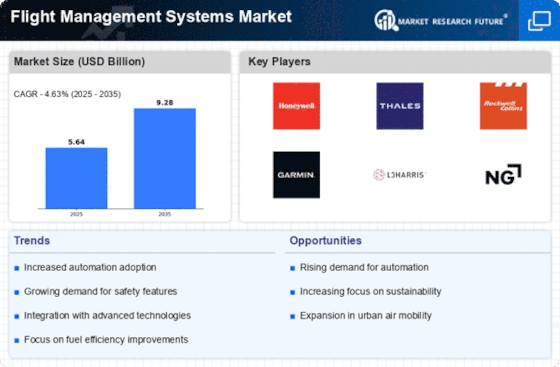Top Industry Leaders in the Flight Management Systems Market

Some of the prominent key players who are increasing the competitive intensity of the market are:
Collins Aerospace(part of united technologies corporation) in the US
Esterline technologies corporation in the US
Garmin Ltd. In the US
General electric company in the US
Honeywell International INC. In the US
Innovative solutions and support Inc. In Us
Jeppesen sanderson, inc. Part of being in the US
NAVBLUE S.A.S(part of airbus) in france
Thales SA in France
Universal avionics systems corporation, which is a part of Elbit systems Ltd in Israel
Strategies Adopted
Industry news within the FMS market reflects ongoing technological advancements, regulatory changes, and the sector's response to the evolving needs of the aviation industry. News related to successful FMS implementations, collaborations with aircraft manufacturers, and advancements in software capabilities showcase efforts to enhance system reliability and operational efficiency. Moreover, developments in satellite navigation technologies, such as the integration of Global Navigation Satellite Systems (GNSS) and augmentation systems, are frequently covered in industry news, reflecting the industry's commitment to staying at the forefront of aviation technology.
Current investment trends in the FMS industry underscore a dual focus on research and development and strategic partnerships. Key players are directing investments towards improving FMS software algorithms, exploring new applications for enhanced aircraft connectivity, and collaborating with aircraft manufacturers for system integration. Investments in digital infrastructure, cybersecurity measures, and compliance with industry standards are prevalent, reflecting the industry's adaptation to the growing emphasis on data security and regulatory compliance. Additionally, strategic investments in acquisitions and partnerships aim to strengthen market presence and enhance the overall capabilities of FMS providers.
Emerging Companies
The overall competitive scenario in the FMS market is characterized by established brands and dynamic newcomers, each navigating the industry with distinct strategies. Market share analysis considers factors such as system reliability, compatibility with diverse aircraft platforms, and the ability to adapt to emerging aviation technologies. The industry's responsiveness to technological advancements, regulatory changes, and the integration of AI further shapes competitiveness. As the aviation sector increasingly recognizes the importance of advanced FMS for operational efficiency and safety, the market is poised for continued growth. Companies in this sector are striving to balance innovation, quality, and affordability to maintain a competitive edge in a complex and rapidly evolving aviation technology landscape.
Recent News
Honeywell Aerospace (USA):
Honeywell's Primus Epic FMS Upgrade: In November 2023, Honeywell announced a significant upgrade for its popular Primus Epic FMS. This upgrade features enhanced navigation capabilities, improved safety features, and integration with next-generation communication systems, making it even more efficient and reliable for pilots.
Focus on Sustainability: Honeywell actively invests in developing fuel-efficient FMS technologies. Their OptiFlight suite optimizes flight routes and procedures, reducing fuel consumption and emissions, contributing to a more sustainable aviation industry.
Thales Group (France):
Thales TopSky FMS Certification: In October 2023, Thales received certification for its TopSky FMS on the Airbus A350F freighter aircraft. This certification expands the reach of Thales' advanced FMS technology, catering to the growing demand for efficient cargo transportation solutions.
Cybersecurity Focus: Thales prioritizes cybersecurity in its FMS development. Their systems incorporate robust security features to protect against cyberattacks and safeguard critical flight data.
Rockwell Collins (USA):
Collins Aerospace ARINC 429 Replacement Initiative: Rockwell Collins, now part of Collins Aerospace, is actively involved in replacing the aging ARINC 429 communication protocol in FMS systems with the modern ARINC 628 standard. This transition enhances data processing capabilities and improves overall system performance.
Open Architecture FMS: Rockwell Collins promotes open architecture FMS designs, allowing for easier integration with various aircraft systems and third-party software applications, offering airlines greater flexibility and customization options.
Leonardo (Italy):
Leonardo Galileo FMS Family Expansion: Leonardo continues to expand its Galileo FMS family with new variants tailored for specific aircraft types and operational needs. This comprehensive range caters to diverse requirements within the commercial and military aviation segments.
Focus on Automation: Leonardo integrates advanced automation features into its FMS systems, such as automatic takeoff and landing capabilities, reducing pilot workload and enhancing operational efficiency.
Universal Avionics Systems (USA):
Universal Avionics SBAS Upgrade: Universal Avionics recently unveiled an upgrade for its FMS systems that enables compatibility with Satellite-Based Augmentation Systems (SBAS). This upgrade improves accuracy and precision of navigation, particularly in challenging signal environments.
Affordability Focus: Universal Avionics prioritizes developing cost-effective FMS solutions, making their technology accessible to a wider range of airlines and aircraft operators.











